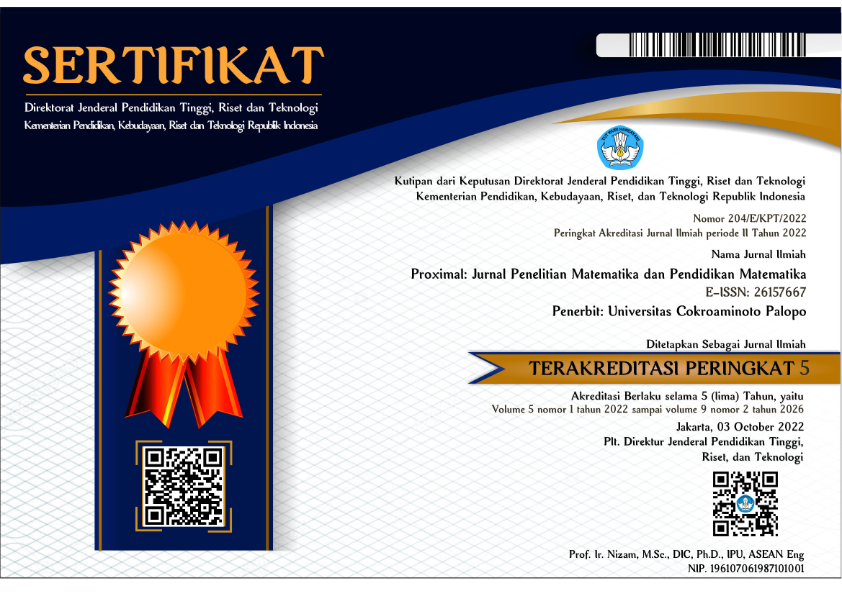Efikasi diri dan Kecemasan Matematika Hubungannya dengan Kemampuan Berpikir Kritis Siswa Kelas XI MIPA
DOI:
https://doi.org/10.30605/proximal.v5i2.1850Keywords:
Self Efficacy, Mathematics Anxiety, Critical Thinking Ability.Abstract
Abstrak. Tujuan penelitian ini untuk mengetahui bagaimana hubungan efikasi diri dan kecemasan matematika terhadap kemampuan berpikir kritis siswa. Metode yang digunakan dalam penelitian ini adalah metode korelasional dengan pendekatan kuantitatif menggunakan populasi terdiri dari siswa kelas XI MIPA SMA Negeri 2 Tambun Utara sebanyak 144 siswa, sedangkan dengan teknik Cluster Random Sampling menggunakan rumus slovin diperoleh sampel sebanyak 106 siswa SMA kelas XI MIPA SMA Negeri 2 Tambun Utara pada tahun ajaran 2021/2022. Instrumen yang digunakan terdiri dari tes kemampuan berpikir kritis siswa sebanyak 8 butir soal dan non tes berupa angket efikasi diri sebanyak 21 pernyataan dan angket kecemasan matematika sebanyak 30 pernyataan. Teknik analisis data menggunakan uji regresi linear berganda dengan menghitung koefisien determinasi dan uji signifikansi hipotesis dengan uji F dan uji T pada taraf signifikan 5%. Hasil penelitian menunjukkan nilai koefisien determinasi sebesar 0,053 atau 5,3% sedangkan sisanya 94,7% dipengaruhi oleh faktor-faktor lainnya. Selain itu, berdasarkan hasil uji hipotesis menggunakan uji F menyimpulkan bahwa efikasi diri dan kecemasan matematika memiliki keterkaitan yang kuat terhadap kemampuan berpikir kritisnya. Sedangkan hasil uji hipotesis dengan uji T secara parsial menunjukkan tidak terdapat hubungan antara efikasi diri terhadap kemampuan berpikir kritis pada siswa. Dan dengan uji T juga dapat disimpulkan bahwa tidak terdapat hubungan antara kecemasan matematika terhadap kemampuan berpikir kritis siswa.Kata Kunci: Efikasi Diri, Kecemasan Matematika, Kemampuan Berpikir Kritis.
Abstract. The purpose of this research was to determine how the relationship between self-efficacy and math anxiety on students’ critical thinking skills. The method used in this research is a correlational method with a quantitative approach using a population consisting of 144 students of class XI MIPA SMA Negeri 2 Tambun Utara, while with the cluster random sampling technique using the slovin formula a sample of 106 student of class XI SMA Negeri 2 Tambun Utara in the academic year 2021/2022. The instrument used consisted of a student’s critical thinking ability test with 8 questions and non-test in the form a selff-efficacy questionnaire with 21 statements and a mathematics anxiety questionnaire with 30 statements. The data analysis technique used multiple linear regression by calculating the coeffient of determination and testing the significance of the hypothesis with the F test and T test at a significant level of 5%. The results showed that the coefficient of determination was 0,053 or 5,3% while the remaining 94,7% was influenced by othe factors. In addition, based on the results of hypothesis testing using the F test, it can be concluded that self-efficacy and math anxiety have a strong relationship with their critical thinking skills. While the results of hypothesis testing with T test show there is no corellation between self-efficacy and critical thinking skills in students. And with the T test also obtained, it can be concluded that there is no corellation between mathematics anxiety and students’ critical thinking skills. Keywords: Self Efficacy, Mathematics Anxiety, Critical Thinking Ability.References
Downloads
Published
Issue
Section
License
In submitting the manuscript to the journal, the authors certify that:
- They are authorized by their co-authors to enter into these arrangements.
- The work described has not been formally published before, except in the form of an abstract or as part of a published lecture, review, thesis, or overlay journal.
- That it is not under consideration for publication elsewhere,
- That its publication has been approved by all the author(s) and by the responsible authorities – tacitly or explicitly – of the institutes where the work has been carried out.
- They secure the right to reproduce any material that has already been published or copyrighted elsewhere.
- They agree to the following license and copyright agreement.
License and Copyright Agreement
Authors who publish with this journal agree to the following terms:
- Authors retain copyright and grant the journal right of first publication with the work simultaneously licensed under Creative Commons Attribution License (CC BY 4.0) that allows others to share the work with an acknowledgment of the work's authorship and initial publication in this journal.
- Authors are able to enter into separate, additional contractual arrangements for the non-exclusive distribution of the journal's published version of the work (e.g., post it to an institutional repository or publish it in a book), with an acknowledgment of its initial publication in this journal.
- Authors are permitted and encouraged to post their work online (e.g., in institutional repositories or on their website) prior to and during the submission process, as it can lead to productive exchanges, as well as earlier and greater citation of published work.















